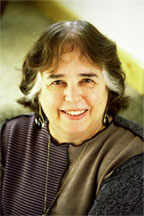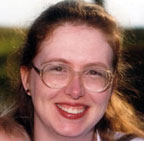ntil recently, I didn’t believe in writer’s block. Some days were more productive than others, but I didn’t have long dry spells. Then I became managing editor at a new virtual magazine, 21st Century Family. I wasn’t thinking about an editor’s job when the publisher inquired about my background; but when he asked, “Would you consider a position as editor?” I accepted knowing I wouldn’t start until the publisher completed some preliminary work. I had plenty of writing to do in the meantime.
Two weeks later, I hadn’t written anything except blog posts and e-mails. Trying to write anything else frustrated me, so I’d clean house. Having no desire to develop my housekeeping skills, I admitted that I, a writer’s block disbeliever, had it bad.
Fortunately, several generous women writers shared their cures. To figure out which one would work, I needed to know why I was blocked. First, I examined my writing habit.

“If you’ve ever attended a workshop with children’s author, Jane Yolen, you’ve heard her say that if you want to write, then ‘BIC.’”
(Photo by Jason Stemple, from Jane’s website)
Form that Habit
To be a writer, you must write even when you don’t feel like it. That’s the first step in combating writer’s block. If you’ve ever attended a workshop with children’s author, Jane Yolen, you’ve heard her say that if you want to write, then “BIC.” That’s Jane’s acronym for “Butt In Chair.” You’re not going to write if you’re puttering in the garden or watching cartoons with the kids. Put your butt in the chair and write.
Don’t wait for inspiration. Sit at your desk or the dining room table. Lock yourself in the bathroom if it’s the only place the kids will leave you alone. Grab a legal pad or the laptop and write. You don’t have to write well. It can be for your eyes only, but just do it. During my writer’s block, my blogs kept me in a routine, working at a particular time, in a particular place, but I needed to do more.
If you don’t have a writing routine, then BIC. It may seem like a waste of time when the words don’t come; but after several weeks, you will develop a writing habit. The writing will come easier and quicker and sometimes, better. Write regularly, and the ability is more likely to be there when you need it. You’ve primed the pump, and the words are ready to flow.
Except for when they don’t.

“Can’t think of what to write? Then write, ‘I don’t know what to write.’”
(Photo Right: Julia Cameron from her website)
Transition into Writing
Sometimes the words won’t come because your brain is consumed with the busyness of your day. Without a transition from getting the kids out the door to your romance novel, it’s hard to get your mind to slow down and focus on the task at hand. Unfortunately, it’s equally hard to write without this focus.
I transition with a quiet task—something that requires little thought but occupies my hands. I knit or cut out kirigami. Sometimes, I pull weeds. Soon my brain chills, I’ve mulled over a writing task, and I’m ready to go.
My writing pal, Lynnea Annette, recommends morning pages as described in Julia Cameron’s The Artist’s Way. Cameron recommends writing three pages as a way to get started each day. Pen in hand, write until you fill three pages. Can’t think of what to write? Then write, “I don’t know what to write.” Maybe it’s self-defense, but your brain will come up with something after writing that two dozen times. Many writers use this technique to begin their workday.
“Starting over can get you past your block.”
Story Problems
When I’ve taken time to transition and am focused, but still can’t write, I usually find a major problem with my story or article. With fiction, I’ve often forced a character “out of character” for the sake of plot. Or my character isn’t being “nice,” so I interfere. To solve this problem, I open a new file and rework the scene or chapter from scratch. Once I know what will work, starting fresh is easier than reworking what’s already broken.
With non-fiction, the problem is usually flawed organization. To fix it, I rewrite non-fiction articles for children’s magazines from scratch. But my articles for Children’s Writer are based on quotes, and starting from scratch would mean combing my interviews to locate all of the best quotes a second time. Instead, I print a copy of the uncooperative article, grab a legal pad, scissors, and tape. After sketching an outline, I write a new lead then proceed to section number one. I write until I need a quote. Cutting that quote from the printout, I tape it onto the new handwritten page. Write, cut, tape. I finish with both a pile of scraps and a decent draft.
Starting over can get you past your block. Just give it a try. Don’t freak out.
“...it is needing to finish something that writers fear.”
Too Late—I’m Freaked Out!
Writers sometimes panic themselves into writer’s block. You’ve made your first sale. Will you continue to sell your work, or will you be a one-hit wonder? You don’t want to let anyone, especially yourself, down.
For fear-based blocks, children’s author and writing teacher, Darcy Pattison, recommends Ted Orland’s Art and Fear: Observations on the Perils (and Rewards) of Artmaking. You’ll see discussions of it on Darcy’s blog, and she’s recommended it to me personally. This book covers what keeps artists from getting back to work when something brings them to a halt.
Other times it is needing to finish something that writers fear. Children’s author, Kristi Holl, blogged about The Now Habit by Neil Fiore. Many writers are intimidated by their goal—finishing a manuscript. To break this particular block, they need to focus not on the end goal, “I have to have this done in two weeks;” but the beginning, “When can I get started?” This focuses on what can be done now, before the kids get home from school or you have to run an errand. You don’t have to finish a possibly unattainable goal. Just get started.
I love starting things and have pages and pages of openings, so Holl’s discovery probably wasn’t going to help me this time. Could I have another fear?
I’m an accomplished writer who takes on just about anything. Reader’s theater? Never done it, but I can figure it out. You need someone to co-author a biography? I once wrote a biography as a reader’s theater script. I can usually learn as I go.
I don’t have this level of confidence as an editor. I edit Mo Scribbles, the newsletter for the Missouri and Arkansas regions of the SCBWI (Society of Children’s Book Writers and Illustrators), but I’m a volunteer. Not a real editor. What if I couldn’t bring in enough articles or tell the good from the bad?
When you freak out, calm down even if it takes some assistance. I contacted my writing buddies. Sometimes, I’d admit I was panicking. Other times, I’d just talk about the new job.
“Awesome. This is something you were meant to do.” Hear something like this often enough and even the thickest among us become believers. I think I can, I think I can...
Once I bought into myself as “editor,” I still needed to start writing again. Some of my writing friends create schedules to call a writing buddy and tell them what they’ve accomplished that day—otherwise known as an accountability partner.
My personal favorite is to write something fun that I don’t do well. For instance, poetry. I read a chapter from In the Palm of Your Hand by Steve Kowit and complete the exercises found in that chapter. Because no one will read it, I’m not hung up on meeting expectations. I can rough something out in about twenty minutes. My poems stink, even when I spend hours on them. So I know what I write next will be better. I move on to what I need to write that day.
This only fails when I’m really and truly in need of a recharge.
“It would all be there when I got home.”
Keeping Charged
No matter how many deadlines you have or how perfect your story idea, sometimes you need to stop. That was the case by the time I had commitments for all twenty-four slots in 21st Century Family’s first issue. I had eighty pages to edit and rewrites to request. I also had a trio of deadlines, and my grade-schooler was out for the summer.
But I bowed to greater wisdom—in this case, my husband’s. It would all be there when I got home. Off we went for a weekend of hiking that looked more like strolling, fishing that looked more like tree catching, and pure relaxation. Hint: The hills of Southern Missouri are perfect because you can’t get consistent cell phone service from any provider.
Fight writer’s block by re-energizing, and work it into your schedule on a regular basis. When someone needs support, my critique group has been known to plan a social “intervention.” Depending on the time of year, my breaks include trips to museums, water gun fights, labyrinth walks, sledding, and firefly catching. I also work in me time—gardening, walking, or reading a great book. Find something you look forward to doing, and keep writer’s block to a minimum as you keep your energy at a maximum.
The next time your writing comes to a halt—step back and examine your situation. Once you figure out why you aren’t writing, you can get back on track, knowing that you have the tools to solve the problem.
***

Sue Bradford Edwards is an editor, writer, and book reviewer who lives and works in St. Louis, Missouri. Find out more about her work at One Writer’s Journey, her blog about writing and editing; the Bookshelf, her book review blog; and her website.